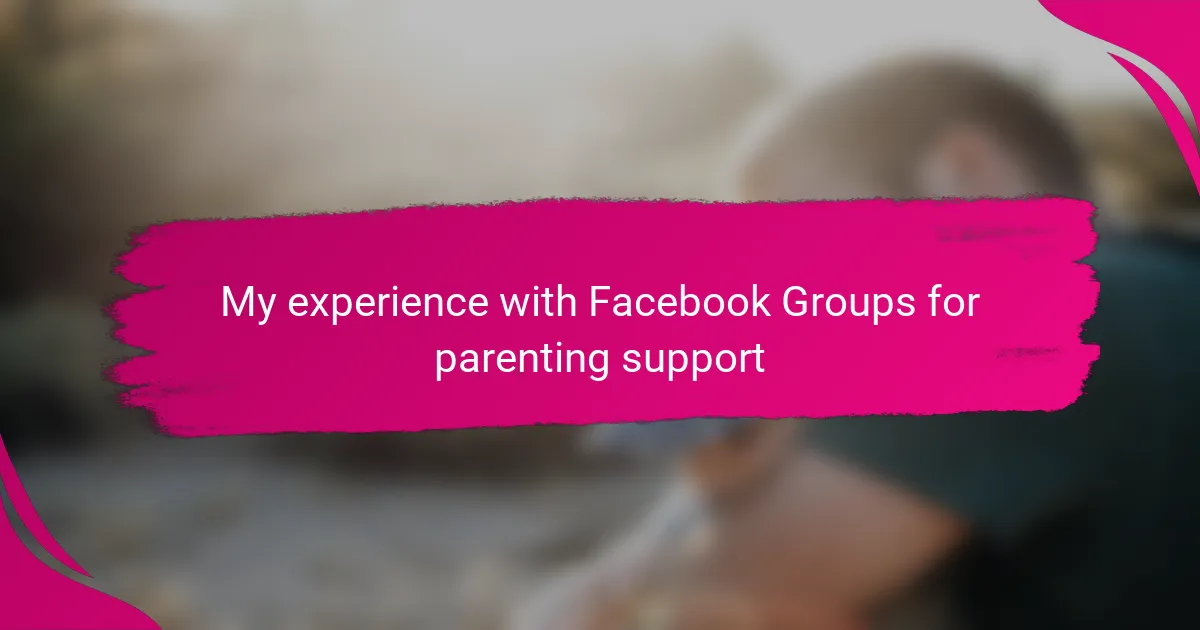Key takeaways
- Facebook Groups provide focused communities for sharing parenting experiences and support, creating a sense of belonging.
- Active participation and sharing personal stories can foster genuine connections and emotional support within these groups.
- Finding the right group involves considering specific needs, the community’s tone, and setting personal engagement expectations.
- Lessons learned emphasize the value of diverse perspectives, self-acceptance, and the importance of emotional encouragement in parenting journeys.
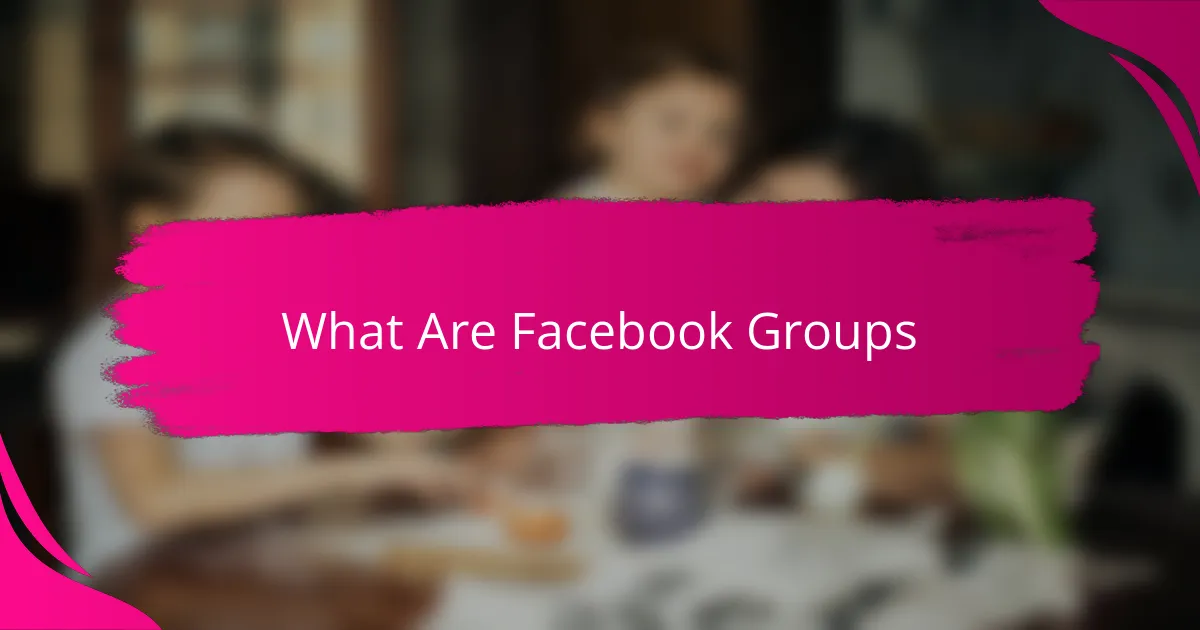
What Are Facebook Groups
Facebook Groups are communities within Facebook where people with similar interests or experiences come together to share, support, and discuss. When I first stumbled upon these groups, I was surprised by how focused and personal the conversations could be—far from the usual social media noise.
Have you ever wanted a space where your parenting questions won’t get lost in a sea of posts? That’s exactly what these groups offer: a dedicated place to connect with others facing the same challenges and joys. I found that feeling understood by others who truly get what I’m going through made a huge difference.
What struck me most is how these groups are more than just forums—they become little support networks. The way members encourage each other, share advice, or just listen reminds me of the community vibe I craved during those exhausting parenting moments. It’s like finding a safe space in the vast digital world.
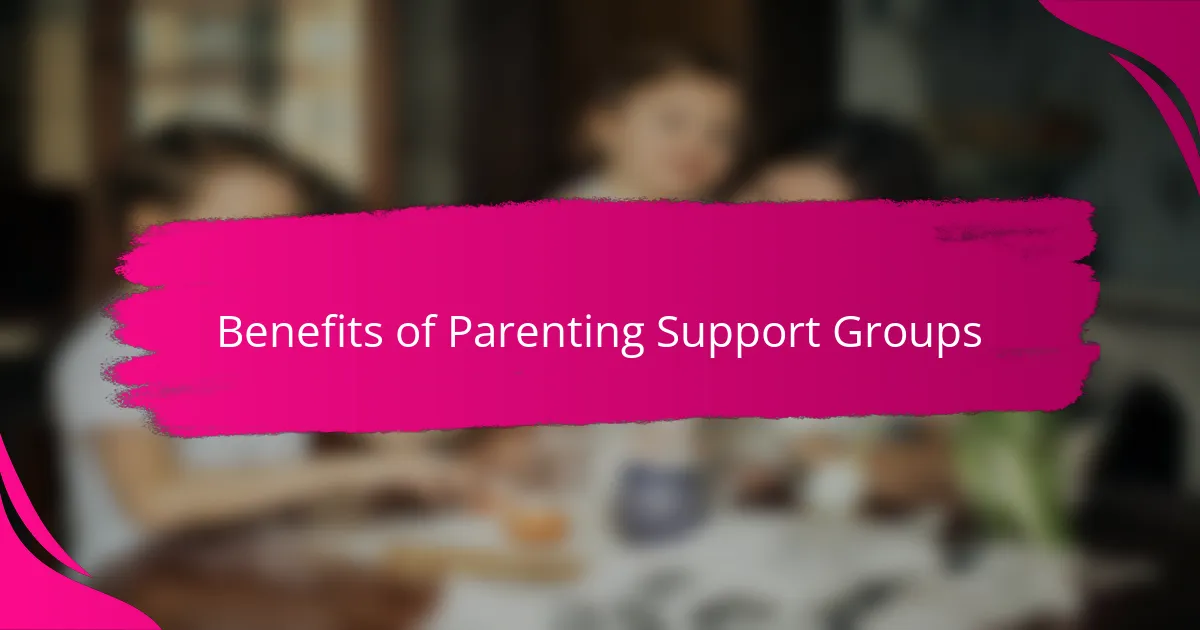
Benefits of Parenting Support Groups
One of the biggest benefits I found in parenting support groups is the instant access to real, practical advice from people who’ve been there. It’s reassuring to know that when you’re stuck in the middle of a sleepless night or a toddler meltdown, you can turn to a group of parents who understand exactly what you’re experiencing. Have you ever felt that too? That relief of finding someone who just “gets it”?
Another thing I appreciate is the emotional support these groups offer. Sometimes, you don’t need solutions—you just need someone to listen, to relate, or to say, “You’re doing great.” In those moments when self-doubt creeps in, reading encouraging messages from fellow parents can lift your spirits more than you’d expect.
Plus, the diversity of experiences shared in these groups opened my eyes to different parenting styles and ideas. It’s like having a toolbox that keeps growing, filled with tips and perspectives I wouldn’t have discovered on my own. Don’t you think having that variety makes the parenting journey richer and less lonely?
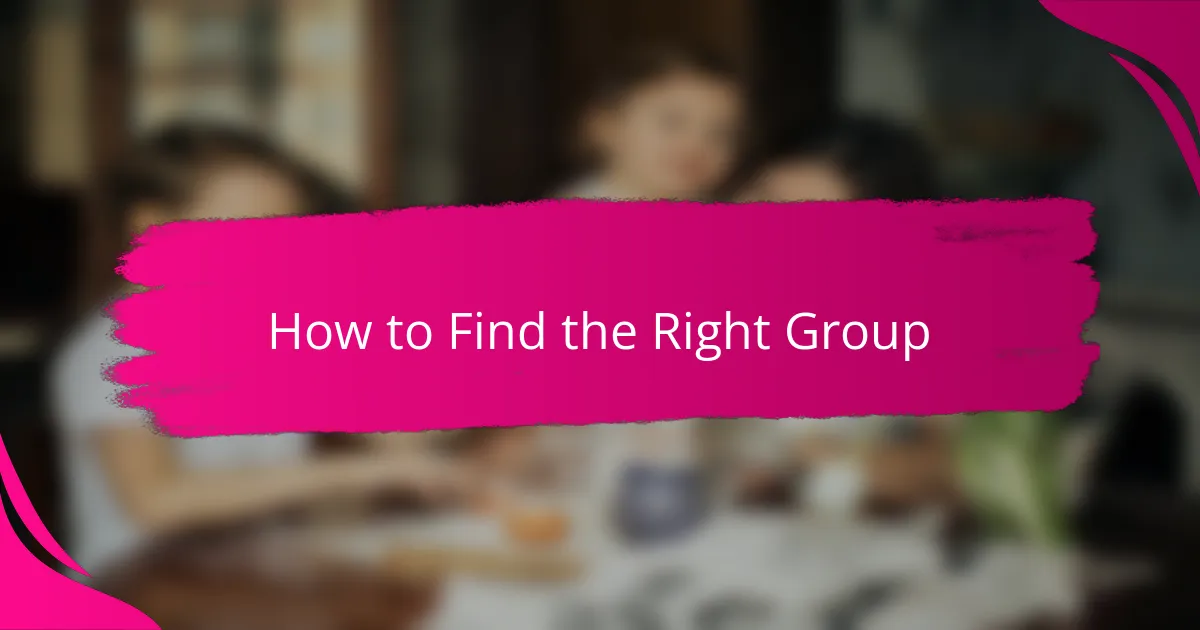
How to Find the Right Group
Finding the right Facebook group starts with knowing what kind of support you truly need. I remember joining a broad parenting group at first, but soon realized it wasn’t quite the fit because the conversations were too general for my stage of parenting. Narrowing down groups by your child’s age or specific challenges made all the difference for me—have you tried filtering groups that way?
Next, I looked for groups with active and respectful communities. It’s one thing to join a group with thousands of members, but it’s another to find one where people regularly respond and support each other genuinely. Reading through recent posts and member interactions gave me a feel for the group’s tone—does it sound welcoming and helpful, or dismissive and chaotic?
Lastly, don’t hesitate to lurk a bit before jumping in. I often spent a few days just reading without commenting, which helped me decide if a group’s vibe matched my needs. Sometimes, seeing how the admin handles conflicts or how members celebrate small wins reveals if a group will be a safe and encouraging space for you. Have you noticed how important that first impression is?
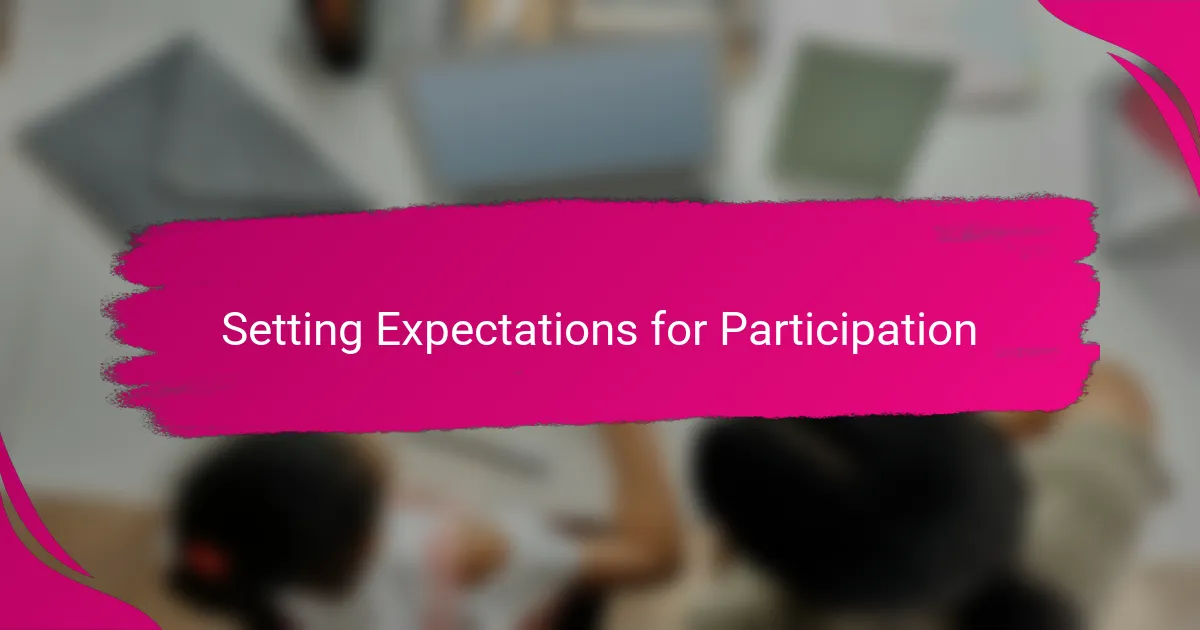
Setting Expectations for Participation
Setting expectations for participation is something I quickly learned is essential. When I joined my first parenting group, I assumed I had to respond to every post or offer advice constantly. But I realized early on that showing up authentically, whether by asking questions or simply reading, was enough to feel connected.
Have you ever worried about saying the wrong thing or not knowing enough to contribute? I’ve been there. It helped me to understand that most members appreciate honest sharing over perfect answers. Knowing this took away the pressure and made participation feel natural.
Also, setting boundaries on how often and when I engaged was key for my well-being. Parenting is demanding, and I didn’t want group time to become another source of stress. So, I decided to check in during specific times, which created a balanced habit that sustained my enthusiasm without overwhelming me.
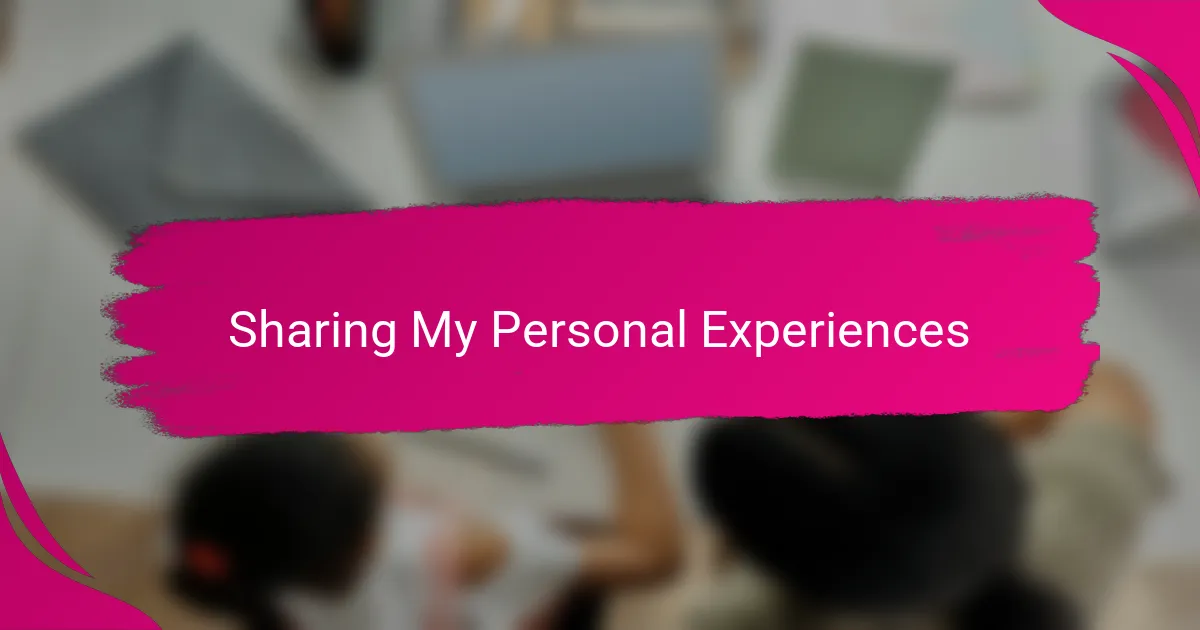
Sharing My Personal Experiences
When I first started sharing my own parenting stories in these Facebook groups, I was nervous about putting myself out there. Would others relate? Would they judge? To my surprise, opening up led to some of the most genuine connections I’ve had online. It felt like finally having a circle that truly understood the messy, beautiful chaos of parenting.
There was a time I posted about a challenging night with my toddler, honestly venting my frustration and exhaustion. The flood of supportive comments and similar stories was more comforting than I expected. Have you ever experienced that relief from just knowing you’re not alone? For me, those moments turned the groups into something much more than just advice forums—they became emotional lifelines.
Of course, sharing sometimes meant facing criticism or unsolicited opinions, which wasn’t always easy. I learned to filter what resonated and to hold onto what felt supportive. That balance helped me keep my voice authentic without losing confidence. Do you find it tricky to navigate diverse reactions online? I’ve been there, and it’s part of the journey toward finding your own parenting tribe.
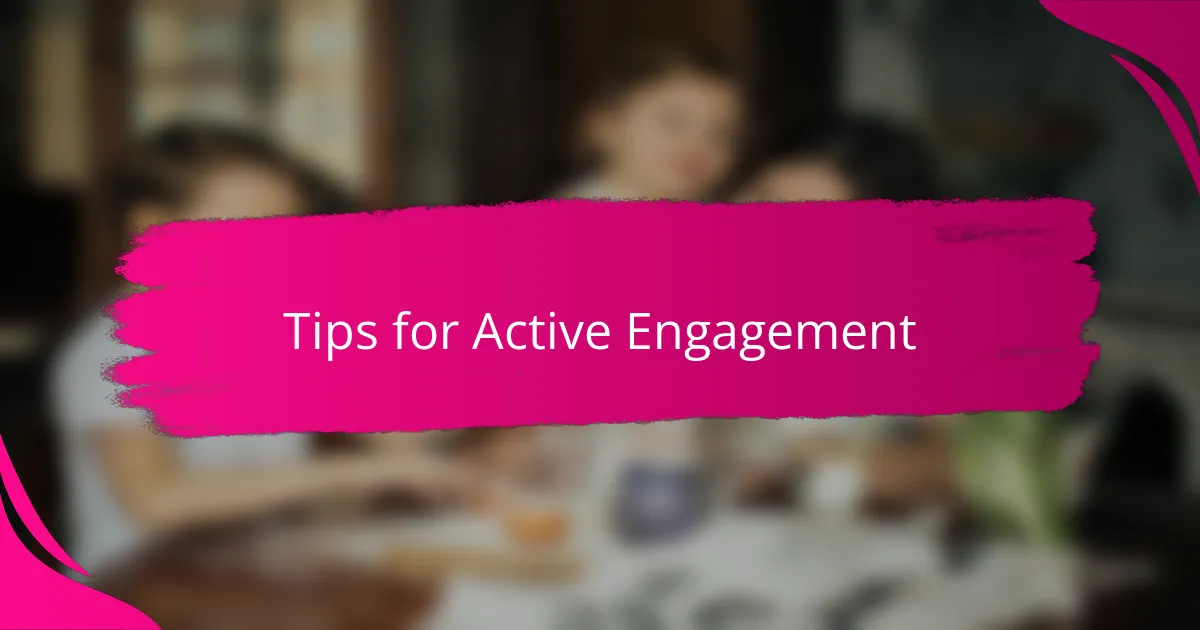
Tips for Active Engagement
Being actively engaged in Facebook parenting groups means more than just scrolling through posts—I found that commenting thoughtfully or asking follow-up questions really deepened my connections. It’s like being part of a conversation rather than just an observer. Have you noticed how a simple reply can spark meaningful dialogues and make you feel more involved?
I also realized that regular participation keeps the momentum going; showing up consistently, even if just to share a quick win or a small insight, builds trust and makes the group feel like a real community. For me, setting small goals to contribute helped turn the group into a genuine support network. Could setting these simple habits make your experience feel more rewarding too?
At the same time, I learned to listen just as much as I speak. Engaging actively doesn’t mean having all the answers—it’s about being present and open to others’ perspectives. Sometimes, reading quietly and reflecting before jumping in gave me a fresh view on my parenting challenges. Have you tried balancing sharing with listening to find that perfect rhythm?
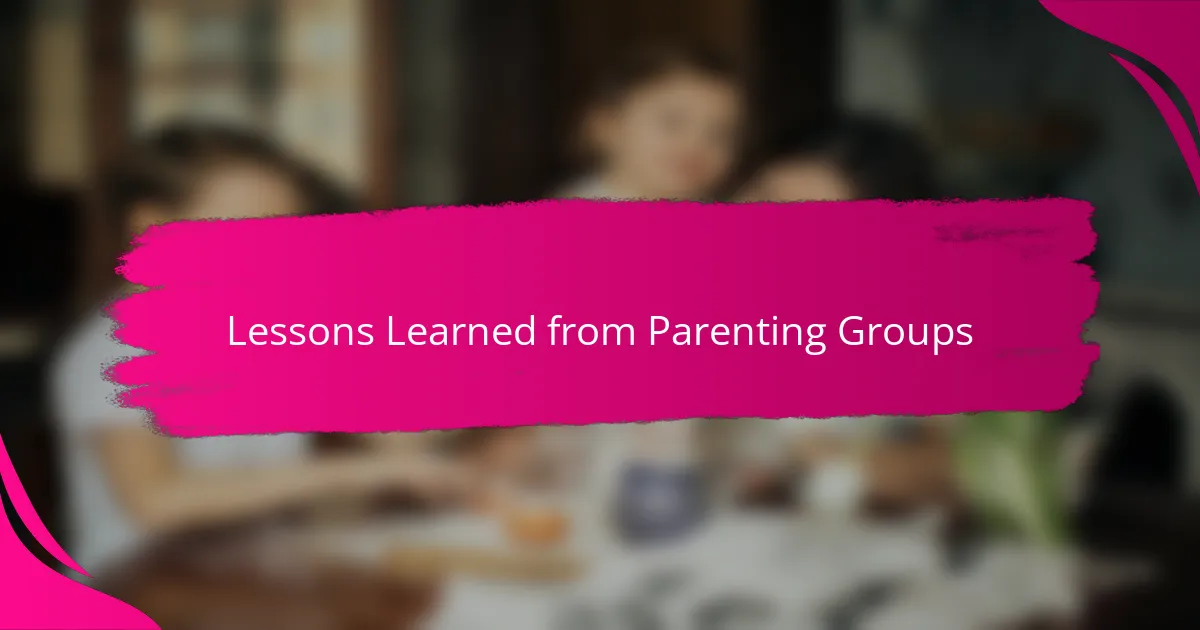
Lessons Learned from Parenting Groups
One lesson that really stayed with me is how diverse parenting really is. I used to worry that my struggles were unique, but hearing stories from all kinds of parents helped me see common threads—and that’s incredibly reassuring. Have you ever been surprised by how many different approaches actually work?
I also learned the importance of giving myself grace through these groups. There were times I got overwhelmed by advice or felt judged, but stepping back and focusing on what resonated made me realize that no one has all the answers. It’s okay to find your own path and take what helps you most.
Another takeaway was how vital emotional support is—sometimes advice isn’t the goal; just knowing others are there, cheering you on, made all the difference. Those little moments of encouragement gave me the strength to keep going during tough days. Have you noticed how a kind word can change your whole perspective?
